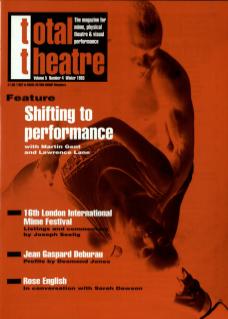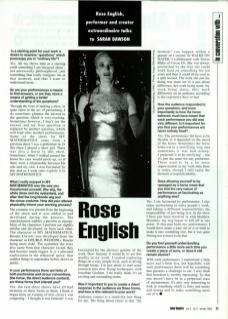Is a starting point for your work a desire to examine ‘questions’ which preoccupy you in ‘ordinary life’?
Yes. All my shows take as a starting point something I am intrigued about – not necessarily philosophically, just something that really intrigues me at that moment, and that I want to understand more.
So are your performances a means to find answers, or are they more a means of getting a better understanding of the questions?
Through the form of making a show, or quite often in the act of performing, I do sometimes glimpse the answer to the question, which is very exciting. Sometimes, however, I don't see the answer and my first question is replaced by another question, which will lead onto another performance. Some of the ideas for My Mathematics came from a previous show I was a performer in. In this show I played a show girl. There was also a horse in this show. Sometimes, when I walked passed the horse his ears would prick up, as if there were a relationship between his role and my own. I was fascinated by this and so I went onto explore it in My Mathematics.
What I really enjoyed in My Mathematics was the way you transformed yourself (the wig, the white dress and the eyelashes), and after that the long blonde wig and the circus costume. How did your altered physicality inform your working process?
The costume was present from the beginning of the show and it was added to and developed during the process. The transformation enables a persona to emerge. Most of the characters I perform are slightly similar and developed on from each other. The character in My Mathematics, Rosita Clavell, was developed from the character in Double Wedding, Rosita being more risqué. The eyelashes she wore also came from that character, except they had become much bigger. It is a personal exploration in the rehearsal space, that enables things to materialise before being shown in public.
In your performance there are hints of both pantomime and circus conventions (the horse, the direct audience contact), are these forms that interest you?
Yes, the last three shows have all had elements of these forms in them. I think it began from an evening of new circus I was compering – I thought it was fantastic! I was fascinated by the abstract quality of the work. How fantastic it would be to use this quality in my work. I started exploring things on a very simple level, such as diving through hoops. I'm just about to start some research into new flying techniques with Jonathan Graham. I do really think it's an exciting and astounding realm.
Was it important to you to create a direct response in the audience via these forms, and how is this relevant to your work?
Audience contact is a relatively new thing for me. The thing about circus is that the moment can happen within a quarter of a second. In Walks on Water, I collaborated with Teresa Blake of Circus Oz. She was always astonished by the way she could work hard on something for ten years and then it could all be over in a split second. The work she saw me doing was more set. It is just about difference, her work being mute, my work being static; they work differently on an audience according to the experience they've had.
How the audience responded to your questions, and more importantly to how the horse behaved, must have meant that each performance you did was very different. Is it important for you that your performances are never entirely fixed? Yes. The performance did have to be flexible as it depended on the mood of the horse. Sometimes the horse behaved in a terrifying way and sometimes it was half asleep. I preferred it to be terrifying! But it's just the same for any performer. There used to be a lot more improvisation in my work than there is today, though I still enjoy the element of unpredictability,
Does allowing yourself to be upstaged by a horse mean that you find the very nature of performance as fascinating as anything else?
Yes. I am fascinated by performance. I also enjoy performing in other people's work, and taking a different responsibility, the responsibility of just being in it. In the show I have just been involved in with Matthew Hawkins, my wig began to fall off at one point. If this had been my performance I would have made a joke out of it or tried to make it into something else, but it was quite freeing not to have to do that.
Do you find yourself understanding performance a little more each time you create a piece of work, or does it still remain elusive?
With each performance I understand a little more and a little less, but hopefully with each performance there will be something that presents a challenge to me. I also think that boredom is terribly interesting. So that one doesn't have be in a perpetual state of enchantment. It's also very interesting to look at something which is fusty and musty and boring and to make something more out of it.

